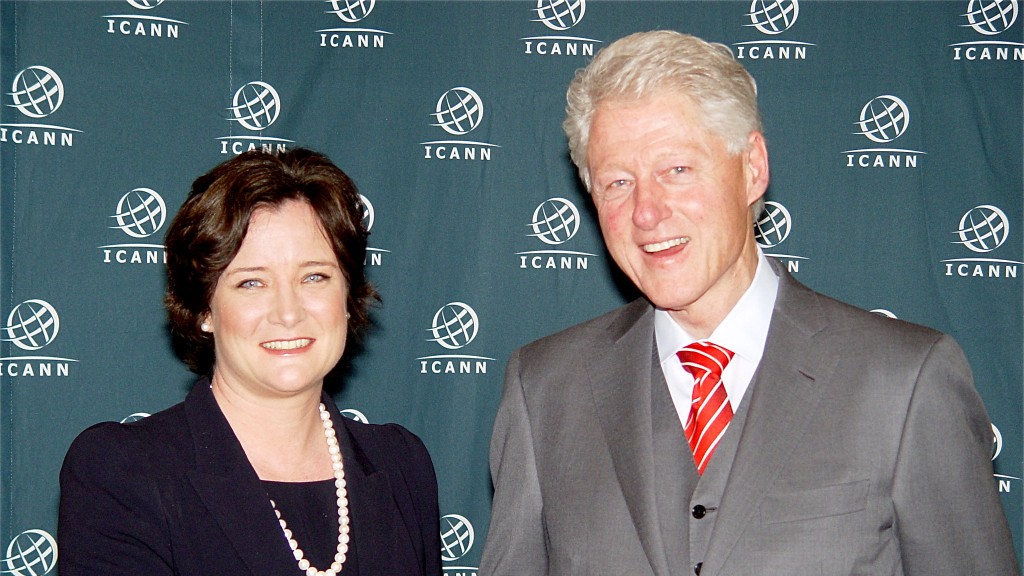Clinton poo poos IANA transition in remarks about Net Freedom

By Emily Taylor
Last week, ICANN’s 49th meeting was all aflutter over the US Government statement, which offered to give up control over the domain name root (IANA). While ICANN delegates were busy trying to work out what they thought, former US President Clinton expressed strong reservations about the plan (from 1:03).
<iframe id="ls_embed_1565083754" src="https://livestream.com/accounts/376536/events/2835475/videos/45798184/player?width=640&height=360&autoPlay=true&mute=false" width="640" height="360" frameborder="0" scrolling="no" allowfullscreen> </iframe>
Clinton is no stranger to ICANN – his administration set it up, and he even got a standing ovation from a starstruck crowd of usually-cynical techies, when he addressed the ICANN San Francisco meeting in 2011.
US oversight has guaranteed Net freedom, says Bill
Clinton’s remarks draw parallels between US “nominal control of domain names” and Net freedom. He said that Snowden’s revelations have given “new energy” to the idea that the US should give up that role.
"We have kept the Internet free and open, and it’s a great tribute to the United States that we have done that"
Bill Clinton
Clinton acknowledged that freedom and openness are not easy, especially as Net freedom gives “the ability to bash the living daylights out of those of us who are in office or have been.” He added that lot of people who’ve been trying to take away the US role “have done this for the sole purpose of cracking down on Internet freedom and limiting it, and have governments protect their backsides rather than empower their people.”
Wikipedia founder says Snowden revelations have eroded US’ credibility
Jimmy Wales, founder of Wikipedia, shared Clinton’s view about the impact on Net freedom. He travels the world, talking to activists who have a problem with the US role. He believes that the first amendment creates a “culture of free expression”. While describing Edward Snowden as a hero, Wales acknowledges that Snowden’s revelations have eroded US’ credibility over Net freedom. “If I go to China and meet with the officials who are censoring the Internet, and say ‘you shouldn’t be spying on your people’, they now say ‘look at what the US is doing’.” He said that when people talk about “respecting local culture” that shouldn’t be an excuse to ban parts of Wikipedia.
“Hillary Clinton made wonderful speeches about Internet freedom agenda. US should be taking leadership. If we are no longer able to take leadership on this, we will be worse off.”
Jimmy Wales
Last week, I expressed skepticism about the ability of a multistakeholder solution to deliver proper accountability. Clinton, too, seems to be wary of an uncritical acceptance of multistakeholder governance: “I understand in theory why we would want to have a multistakeholder process. I favour that, I just know that a lot of these so called multistakeholders are governments who want to gag people and restrict access to the Internet.”
The United States has been by far the country most committed to keeping the Internet free open and uninterrupted, and a lot of these people who say they want multistakeholder control what they really want is the ability to shut down inconvenient exchanges in their own countries.
Bill Clinton
It’s certain that the Snowden revelations have damaged US credibility in advocating a free and open Internet. While I agree with Clinton and Wales’ remarks about the importance of maintaining Net freedom, it’s wrong to conflate content issues with Internet addressing. As the demographics of Internet users shift East and South, it’s inevitable that there will be tensions over what content should be allowed, blocked, censored. These are difficult issues to balance.
Naming and addressing makes the Internet work, and it’s important that it should be run responsibly and with proper accountability. Personally, I’m not convinced that there’s such a connection between Net freedom and the US’ largely clerical role in authorising changes to the domain name root database. Replacing that US government role with a sprawling mess of multistakeholders risks cutting ICANN loose from all accountability, and that would be bad. To misquote Dash from the Incredibles, “when everyone’s in charge, no one is”.

